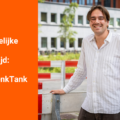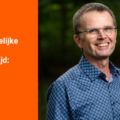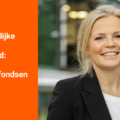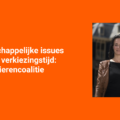
In the run-up to the (early) House of Representatives elections of November 2023, various issue owners will speak out who are committed to getting important issues on the political agenda. The reason for this series is the growing recognition of the importance of social issues and the active role that various organizations play in influencing policymakers and politicians.
In the second interview, Rafke Hagenaars, chairman of the LAKS, speaks. The LAKS is concerned with everything related to the theme of education and young people. How does this organization ensure attention is paid to their issue during the upcoming elections?
“The LAKS believes it is important that more attention is paid to the mental health of young people and that education is inclusive.”
Which issues are relevant to your organization in the run-up to the elections?
LAKS is committed to all secondary school students in the Netherlands. This means that everything surrounding education is relevant to our organization. In particular, we see that the mental health of students – and young people in general – is deteriorating rapidly. That is why we think it is important that parties have concrete action points to combat performance pressure. In addition, we still see that segregation and inequality of opportunity are major problems in our education. Students from different educational disciplines hardly meet each other and the differences in available resources for students are also increasing. While one student has access to tutoring, a laptop and the opportunity to go on all school outings, the other student goes to school hungry and receives little education because there are too few teachers. For this reason, we also think it is important that parties have plans for anti-poverty policy. Consider abolishing the voluntary parental contribution, providing school meals and combating private parties that provide additional education.
Do you think that your social issue will be on the political agenda this election period? And are you actively working on this as an organization?
Unfortunately, many parties do not have education high on their agenda, but a number of parties do draw attention to education. For example, parties talk about broad bridge classes to combat segregation and free school meals are mentioned in various party programs. Relatively much attention is paid to combating inequality of opportunity. However, we are surprised that parties do not say much about the well-being of young people. Several studies have shown in recent years that school pressure is a major contributor to the deteriorating mental health of students. Unfortunately, too little attention is paid to performance pressure.
The LAKS is actively lobbying to bring various social problems related to education to the attention of politicians. LAKS does this in conversations with politicians, in the media and together with Het Jonge Geluid we let the voices of young people between 12 and 35 be heard.
Has the issue your organization is dealing with received more attention during this election period? And in what way?
To date, the above issues have mainly come to attention in party programmes. These programs are of course not read by everyone. We notice in the public debate that there is still too little about education. Climate and migration are currently receiving more attention. Although it is good that it is about climate and migration, education is still lagging behind. In particular, attention to the (mental) well-being of young people is lagging behind.
What should voters pay attention to if they find your issue and social theme important?
LAKS believes it is important that more attention is paid to the mental health of young people and that education is inclusive. Voters who also find this important should pay attention to how many parties actually write and what they say about education. Do parties pay attention to education at all? In addition, to combat segregation, it is best for voters to choose parties that want to encourage students to meet each other more often. Think of community schools, broad bridge classes and a postponed selection moment. For inclusive education, it is also important that parties pay attention to anti-poverty policy. How do parties plan to combat poverty in schools? Finally, the mental health of students and combating inequality of opportunity go hand in hand with the fact that education should be more focused on the personal development of the student and what students want: which parties listen to students?





